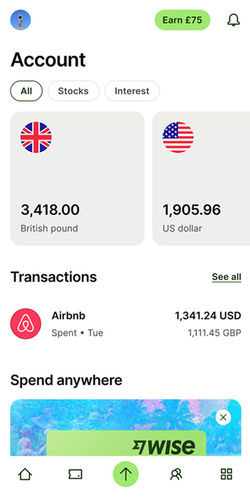The best, fastest & cheapest ways to send money to United Kingdom
Compare money transfer services and find the cheapest and easiest ways to make money transfers to United Kingdom.
Learn how to secure the best GBP exchange rates at the lowest transfer fees, ensuring a smooth and easy transfer process.
If you just need the best service for GBP transfers, it is Wise. Out of 16 companies tested that support GBP, they appeared 100% of the time as the top-rated provider in our comparisons.
Otherwise, keep reading for expert tips, top GBP transfer deals, and everything you need to know about transferring money to United Kingdom.
Send money to United Kingdom
"Over 16 million customers use Wise, mostly for their excellent mobile app, transparent fee structure & use of mid-market rates. Now increasingly used for larger transfers."
"Over 16 million customers use Wise, mostly for their excellent mobile app, transparent fee structure & use of mid-market rates. Now increasingly used for larger transfers."
"Over 16 million customers use Wise, mostly for their excellent mobile app, transparent fee structure & use of mid-market rates. Now increasingly used for larger transfers."
"Xe has over 30 years of currency exchange experience, and is one of the most reputable names on the market. 200 countries, 100 currencies, & funds often received in seconds."
"Xe has over 30 years of currency exchange experience, and is one of the most reputable names on the market. 200 countries, 100 currencies, & funds often received in seconds."
"Xe has over 30 years of currency exchange experience, and is one of the most reputable names on the market. 200 countries, 100 currencies, & funds often received in seconds."
"Over 16 million customers use Wise, mostly for their excellent mobile app, transparent fee structure & use of mid-market rates. Now increasingly used for larger transfers."
"Over 16 million customers use Wise, mostly for their excellent mobile app, transparent fee structure & use of mid-market rates. Now increasingly used for larger transfers."
"Over 16 million customers use Wise, mostly for their excellent mobile app, transparent fee structure & use of mid-market rates. Now increasingly used for larger transfers."
"Currencies Direct have over 30 years of global money transfer expertise. Award winning service with a TrustPilot rating of 4.9. Lock-in rates for the future or trade 24/7 on web or mobile."
"Currencies Direct have over 30 years of global money transfer expertise. Award winning service with a TrustPilot rating of 4.9. Lock-in rates for the future or trade 24/7 on web or mobile."
"Currencies Direct have over 30 years of global money transfer expertise. Award winning service with a TrustPilot rating of 4.9. Lock-in rates for the future or trade 24/7 on web or mobile."
"Revolut has 50+ million customers globally. You can hold up to 36 currencies in the app and send money quickly in 70+ currencies to 160+ countries."
"Revolut has 50+ million customers globally. You can hold up to 36 currencies in the app and send money quickly in 70+ currencies to 160+ countries."
"Revolut has 50+ million customers globally. You can hold up to 36 currencies in the app and send money quickly in 70+ currencies to 160+ countries."
"24/7 live chat support provided in six languages. Special first transfer rates available, with airtime topup supported to many countries in Africa, Asia and South America."
"24/7 live chat support provided in six languages. Special first transfer rates available, with airtime topup supported to many countries in Africa, Asia and South America."
"24/7 live chat support provided in six languages. Special first transfer rates available, with airtime topup supported to many countries in Africa, Asia and South America."
"Key Currency offers a personal service with a dedicated account manager. There are no transfer limits or fees which is perfect for larger send amounts."
"Key Currency offers a personal service with a dedicated account manager. There are no transfer limits or fees which is perfect for larger send amounts."
"Key Currency offers a personal service with a dedicated account manager. There are no transfer limits or fees which is perfect for larger send amounts."
"Xe has over 30 years of currency exchange experience, and is one of the most reputable names on the market. 200 countries, 100 currencies, & funds often received in seconds."
"Xe has over 30 years of currency exchange experience, and is one of the most reputable names on the market. 200 countries, 100 currencies, & funds often received in seconds."
"Xe has over 30 years of currency exchange experience, and is one of the most reputable names on the market. 200 countries, 100 currencies, & funds often received in seconds."
"OFX have been helping individuals and businesses send money for over 25 years. Transfer in 50+ currencies to 170+ countries, with 24/7 phone access to currency experts."
"OFX have been helping individuals and businesses send money for over 25 years. Transfer in 50+ currencies to 170+ countries, with 24/7 phone access to currency experts."
"OFX have been helping individuals and businesses send money for over 25 years. Transfer in 50+ currencies to 170+ countries, with 24/7 phone access to currency experts."
"Regency's UK-based account management team has vast experience. Get support on all kinds of transfers, from overseas property transactions to business payments & more."
"Regency's UK-based account management team has vast experience. Get support on all kinds of transfers, from overseas property transactions to business payments & more."
"Regency's UK-based account management team has vast experience. Get support on all kinds of transfers, from overseas property transactions to business payments & more."
"Currencyflow is a new FX broker with a focus on transparent, fair rates and accessible customer service. Contact the UK-based team for a free quote."
"Currencyflow is a new FX broker with a focus on transparent, fair rates and accessible customer service. Contact the UK-based team for a free quote."
"Currencyflow is a new FX broker with a focus on transparent, fair rates and accessible customer service. Contact the UK-based team for a free quote."
"Lumon has cared for over 69,000 customers since 2000. Get support for larger transfers from dedicated currency specialists."
"Lumon has cared for over 69,000 customers since 2000. Get support for larger transfers from dedicated currency specialists."
"Lumon has cared for over 69,000 customers since 2000. Get support for larger transfers from dedicated currency specialists."
"Xoom, a PayPal service, allows you to send money in more than 160 countries. You can send cash for over-the-counter pickup or home delivery, as well as send by bank transfer or debit card."
"Xoom, a PayPal service, allows you to send money in more than 160 countries. You can send cash for over-the-counter pickup or home delivery, as well as send by bank transfer or debit card."
"Xoom, a PayPal service, allows you to send money in more than 160 countries. You can send cash for over-the-counter pickup or home delivery, as well as send by bank transfer or debit card."
"Securely send money to and from 150+ countries and 20+ currencies. Same-day transfers avaialble on most major currencies."
"Securely send money to and from 150+ countries and 20+ currencies. Same-day transfers avaialble on most major currencies."
"Securely send money to and from 150+ countries and 20+ currencies. Same-day transfers avaialble on most major currencies."
"Fast, secure internatinal transfers with no fees and transparent rates. They offer a free currency card for use at home and abroad."
"Fast, secure internatinal transfers with no fees and transparent rates. They offer a free currency card for use at home and abroad."
"Fast, secure internatinal transfers with no fees and transparent rates. They offer a free currency card for use at home and abroad."
"Paysend has transparent fees and rates, with transfer sent within seconds to your recipient's bank. They also have global 24/7 support for any enquiries, and bank-level security."
"Paysend has transparent fees and rates, with transfer sent within seconds to your recipient's bank. They also have global 24/7 support for any enquiries, and bank-level security."
"Paysend has transparent fees and rates, with transfer sent within seconds to your recipient's bank. They also have global 24/7 support for any enquiries, and bank-level security."
"Moneycorp is an established player in the market, with a focus on private clients and corporates. Make overseas payments in over 120 currencies and 190 countries."
"Moneycorp is an established player in the market, with a focus on private clients and corporates. Make overseas payments in over 120 currencies and 190 countries."
"Moneycorp is an established player in the market, with a focus on private clients and corporates. Make overseas payments in over 120 currencies and 190 countries."
"Moneygram is a well established service with over 80 years in the sector. They support over 200 countries worldwide and have over 440,000 retail locations."
"Moneygram is a well established service with over 80 years in the sector. They support over 200 countries worldwide and have over 440,000 retail locations."
"Moneygram is a well established service with over 80 years in the sector. They support over 200 countries worldwide and have over 440,000 retail locations."
How to send money to United Kingdom with the best rate
Always compare rates
Don't pay more than you have to. Use our live comparison tool to make sure you aren't missing the best rates when sending money to United Kingdom.
Choose a provider
Select the provider that offers you the most GBP and fits your needs.
Click, sign up & send
Follow the steps & make your transfer. Your funds will soon be on their way to your chosen country & currency.
We found Wise to be the best way to send money to United Kingdom.
After testing and reviewing 16 money transfer providers servicing United Kingdom, Wise came out on top.
Wise offers quick transfers, adds a 0% markup on GBP transfers, and costs $30.03 in fees.
This makes it the best option for a mix of cost, speed & features for GBP transfers.

Key Currency: The cheapest way to send money to United Kingdom
Key Currency charges $0 per transfer to United Kingdom, with a 0.25% markup on the GBP exchange rate. This is 0.01% cheaper than the second cheapest option.
To get the most out of your transfer to United Kingdom, use a bank transfer deposit to maximize the amount of GBP received.

Wise is the fastest way to send money to United Kingdom
With Wise, the transfer time to United Kingdom is same day.
charges $30.03 and adds a markup of 0% on top of the GBP exchange rate. This is 0% cheaper than the next best option as of February 2026.
For the best combination of speed and cost, we recommend using a to fund your transfer to United Kingdom.
*This is based on a $7,000 transfer to United Kingdom.

Wise is the easiest way to send money to United Kingdom
Wise is very transparent with its fees, charging $30.03 and 0% markup on GBP transfers.
They offer multiple deposit options, have good customer service, and take less than 5 minutes to get started with.

Consider this before sending money to United Kingdom
The UK is a global financial hub and a top destination for remittances, not just for family support, but also for tuition payments, property investments, and freelance work.
Our data shows that Key Currency is consistently the cheapest option to send GBP.
Whether you're sending from the U.S., Europe, or the Middle East, comparing services ensures you get the best exchange rate and lowest fees.
Sending large amounts of money to United Kingdom
Sending large amounts to United Kingdom can be expensive. You should consider the exchange rate, transfer limits, customer service, safety, company experience with large transfers, and any legal requirements in United Kingdom.
In this case, Wise ticks all the boxes. Out of 16 money transfer companies serving United Kingdom, Wise came on top as the highest-rated company for GBP transfers.
Whether you are buying a property in United Kingdom, funding your education, having a destination wedding, or just need to send a lot of GBP, we recommend opting for a specialized provider such as Wise.

Understanding the costs involved when moving money to United Kingdom
When calculating the cost of money transfers to United Kingdom, here's what really matters: the country of origin, amount, payment method, fees, and the markup on the GBP exchange rate.
Exchange rate markup
This is a percentage added on top of the "real" GBP rate (known as the mid-market rate).
Wise, for example, offers the best exchange rate. It adds 0% markup to the USD-GBP exchange rate (0.7342 GBP - 0% per US Dollar).
Transfer fees
These are fixed and/or percentage fees added for the service when sending money to United Kingdom.
Let's imagine you want to send $7,000 from the US to United Kingdom.
After analyzing 16 companies supporting Pound Sterling, we found Key Currency to offer the lowest fees ( $0 in fees and 0.25% markup).
However, exact fees vary by deposit method and the service, for example:
Bank transfers vary from $0 to $490.00000000000006
Debit cards range from $0 to $0
Credit card fees vary a lot, mainly due to cash advance fees and/or additional fees from your credit card provider.

Get the best GBP exchange rate
The exchange rate is the value of the GBP (Pound Sterling) against other currencies, and since it fluctuates, it will affect how much GBP the recipient will get. Sending money when GBP reaches the highest value will result in more GBP for your recipient.
Over the past 7 days, the GBP exchange rate has:
Averaged at 0.7335 Pound Sterling per USD
Reached a high of 0.735 GBP/USD
Dropped to a low of 0.731 GBP per US Dollar
You should aim to make a transfer when the rate is closer to 0.735 GBP/USD . This will give your recipient in United Kingdom more Pound Sterling.
Pair your transfer with Wise (who offers the best exchange rate), and you will maximize the amount of GBP received.
Get notified when it’s the best time to send GBP
Sign up for our rate alerts, and we’ll notify you when it’s the best time to send GBP!
Payment methods available for money transfers to United Kingdom
How you fund your money transfer to United Kingdom directly affects the speed, cost, and the amount of GBP your recipient will receive. Here are the most common options for funding your transfer to United Kingdom:
Bank transfers
Bank deposits are reliable and common for international GBP transfers, available through most services.
While they tend to be cheaper, it may take up to 2-3 business days for the funds to arrive.
You also may have an option to use the SWIFT network for a bank deposit to United Kingdom, avoid it where possible. SWIFT deposits are slow and expensive, instead check if there are cheaper options.
Based on our recent testing of 16 providers accepting United Kingdom transfers, we found Key Currency to be the cheapest option, charging $0 per transfer with a 0.25% markup.

Debit and prepaid cards
Debit card transfers to United Kingdom are generally faster than bank transfers. Most GBP transactions will be completed within a few hours. However, this convenience usually comes with increased fees.
We recommend Paysend for debit and prepaid card deposits when sending money to United Kingdom. Paysend charges a 1.46% markup on the GBP rate and $0 in transfer fees.

Credit cards
A credit card deposit is another option for sending GBP to United Kingdom.
Typically it is more expensive, and your CC company may charge you cash advance fees, and apply increased interest rates.
If you want to fund your transfer to United Kingdom with a credit card, we to get the best deal.

How we analyze the market
We track the cost, speed, and product offerings of the leading money transfer services available in United Kingdom.
Our comparison engine and algorithms evaluate providers based on over 25 factors, including transfer fees, ease of use, exchange rates, mobile apps, transfer times & customer support.
We also consider how these services are rated on platforms like TrustPilot, AppStore, and Google Play, giving you a comprehensive view of what to expect.
This thorough analysis helps you get the best available deal - every time you want to move money to United Kingdom.
We also provide unbiased and detailed reviews of all the top money transfer companies. You can use these reviews to find the best service for your needs when sending money to United Kingdom
For a deeper understanding of our commitment to integrity and transparency, we invite you to read our editorial policy and review methodology.

Related transfer routes
Send money from United Kingdom
Send money to United Kingdom
FAQs
Find answers to the most common questions on our dedicated FAQ page.
How much money can I transfer to United Kingdom, and are there any limits?
Are there tax implications when sending funds to United Kingdom?
What are the typical fees and exchange rates for sending GBP?
How long will it take for my money to reach United Kingdom?
Can I schedule regular GBP transfers?
What currency is used in United Kingdom?
Can I send GBP from any country?
How can I track my money transfer to United Kingdom, and what should I do if something goes wrong?
Is it better to use my bank for GBP transfers?
Can I use MoneyTransfers.com to money transfers?
Tools & resources
Contributors








.svg)














